[Kobe City] “Kobe City Museum” is a famous Showa-era building that was renovated from a former bank.
![[Kobe City] “Kobe City Museum” is a famous Showa-era building that was renovated from a former bank.](https://resources.matcha-jp.com/resize/720x2000/2023/12/16-157473.webp)
It is a retro-style building from the Showa period, and is a recommended spot for architecture buffs. Large exhibitions are often held, but admission is free for high school students and younger. We will introduce the highlights of the Kobe City Museum, permanent exhibitions, museum shop, and cafe information.
-
Table of Contents
- Kobe City Museum: A masterpiece of Showa era architecture
- It houses the National Treasure Sakuragaoka Bronze Bell and Bronze Spear, as well as the Important Cultural Property Xavier Statue.
- The permanent exhibition area on the first floor is free to visit.
- Stop by the museum shop and cafe
- Great value bus tickets
- basic information
Kobe City Museum: A masterpiece of Showa era architecture
![[Kobe City] “Kobe City Museum” is a famous Showa-era building that was renovated from a former bank.](https://resources.matcha-jp.com/resize/720x2000/2023/12/16-157474.webp)
The Kobe City Museum was opened in 1982 as a merger between the Kobe City Nanban Museum in Chuo Ward and the Kobe City Archaeological Museum in Suma Ward . This building was originally used as the Kobe branch of the Yokohama Specie Bank (now Mitsubishi UFJ Bank), but was renovated and reborn as the Kobe City Museum.
It is said to be a masterpiece of architecture from the early Showa period, and was registered as a cultural property in 1998. It seems that many people with an interest in architecture visit the building.
Kobe has long been an international port city and has played the role of a gateway for cultural exchange with other countries. In light of this, the museum holds exhibitions and other activities on the theme of "International Cultural Exchange, Contact and Transformation of Eastern and Western Cultures."
![[Kobe City] “Kobe City Museum” is a famous Showa-era building that was renovated from a former bank.](https://resources.matcha-jp.com/resize/720x2000/2023/12/16-157475.webp)
The first thing to note is the retro-feeling building, designed by Sakurai Sakurai, the first Japanese architect to be certified by the Royal Institute of British Architecture.
The facade is in the Doric style, one of the ancient Greek architectural styles, and is lined with six sturdy conical columns with slightly flared tops.
It houses the National Treasure Sakuragaoka Bronze Bell and Bronze Spear, as well as the Important Cultural Property Xavier Statue.
![[Kobe City] “Kobe City Museum” is a famous Showa-era building that was renovated from a former bank.](https://resources.matcha-jp.com/resize/720x2000/2023/12/16-157476.webp)
Kobe City Museum has a collection of about 70,000 items. Of these, 21 items are national treasures and 76 items are important cultural properties. Among them, the national treasure "Sakuragaoka Bronze Bell and Bronze Spear" and the important cultural property "Statue of St. Francis Xavier" are among the most valuable items.
These can be viewed in a dedicated exhibition room in the Collection Exhibition Room on the 2nd floor (fee required).
![[Kobe City] “Kobe City Museum” is a famous Showa-era building that was renovated from a former bank.](https://resources.matcha-jp.com/resize/720x2000/2023/12/16-157477.webp)
The Kobe City Bronze Bell and Bronze Spear were discovered by chance in 1964 during soil removal work in the mountains of Sakuragaoka Nada Ward, Kobe.
The site was designated a national treasure because it contained the collection of 14 bronze bells and seven bronze spears believed to have been made between the middle and late Yayoi period, and because four of the bronze bells are highly acclaimed for their intricate paintings.
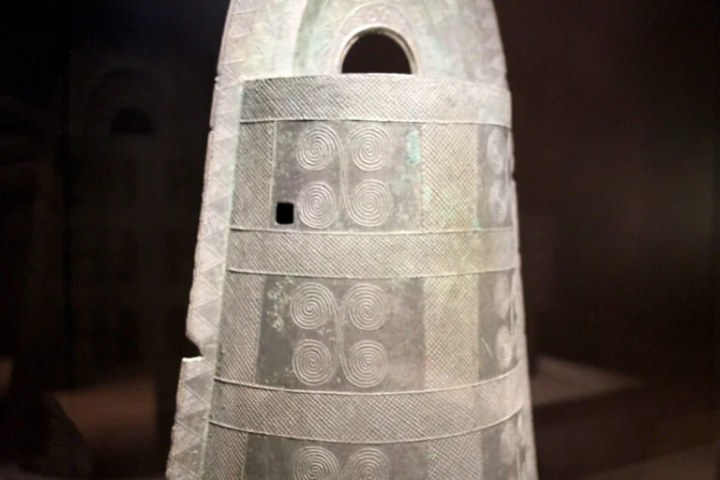
![[Kobe City] “Kobe City Museum” is a famous Showa-era building that was renovated from a former bank.](https://resources.matcha-jp.com/resize/720x2000/2023/12/16-157479.webp)
The "Statue of St. Francis Xavier," an Important Cultural Property, is a painting discovered in 1920 in a private home in Sendaiji , Ibaraki City, Osaka Prefecture . Xavier is known as the man who spread Christianity in Japan. When Christianity was banned, items related to Christianity were destroyed, but this statue of Xavier secretly escaped and is a valuable painting that has survived to the present day.
In order to preserve the artwork, the Hara is only on display for a limited period of the year. Outside of that period, a replica is on display, so if you want to see the real thing, be sure to check the official website in advance to see when the real thing will be on display.
![[Kobe City] “Kobe City Museum” is a famous Showa-era building that was renovated from a former bank.](https://resources.matcha-jp.com/resize/720x2000/2023/12/16-157480.webp)
The collection exhibition room also hosts exhibitions with different themes for each period in the four categories of "Art," "Birds of Prey, Glass and Vidromantic Art," "Ancient Maps," and "Archaeology and History."
Collection Exhibition Room (2nd floor) Admission: 300 yen for adults, 150 yen for university students, free for high school students and younger. If you present a special admission ticket on the day, admission is 200 yen for adults and 100 yen for university students. *Discounts are subject to change (please check at the general information desk on the 1st floor)
The permanent exhibition area on the first floor is free to visit.
![[Kobe City] “Kobe City Museum” is a famous Showa-era building that was renovated from a former bank.](https://resources.matcha-jp.com/resize/720x2000/2023/12/16-157481.webp)
On the first floor of the Kobe City Museum, there is a permanent exhibition called the Kobe History Exhibition Room, which is open to the public for free. It introduces Kobe's history by era, and you can learn about the path Kobe has taken as it prospered alongside the sea and port.
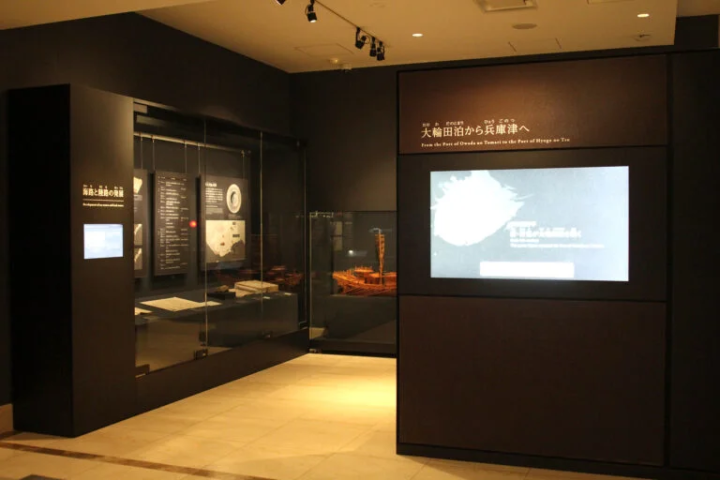
![[Kobe City] “Kobe City Museum” is a famous Showa-era building that was renovated from a former bank.](https://resources.matcha-jp.com/resize/720x2000/2023/12/16-157483.webp)
Within the Kobe History Exhibition Room, there is also a Regional Cultural Assets Exhibition Room, where you can learn more about Kobe's history (the theme changes regularly).
In fact, this "Regional Cultural Property Exhibition Room" is where the safe used to be during the time of the former Yokohama Specie Bank. When you look at the entrance, can you see how thick the walls are? It's wonderful to think that where the important safe once stood, precious art pieces from Kobe are now being carefully exhibited.
![[Kobe City] “Kobe City Museum” is a famous Showa-era building that was renovated from a former bank.](https://resources.matcha-jp.com/resize/720x2000/2023/12/16-157484.webp)
In the "Kobe History Exhibition Room," you should definitely check out the "Opening the Port: Interaction with the World" area, which features models of the foreign visitors settlement from the Meiji period and the former foreign visitors settlement from the Showa period. The models, created based on historical documents, are very detailed and well worth seeing.
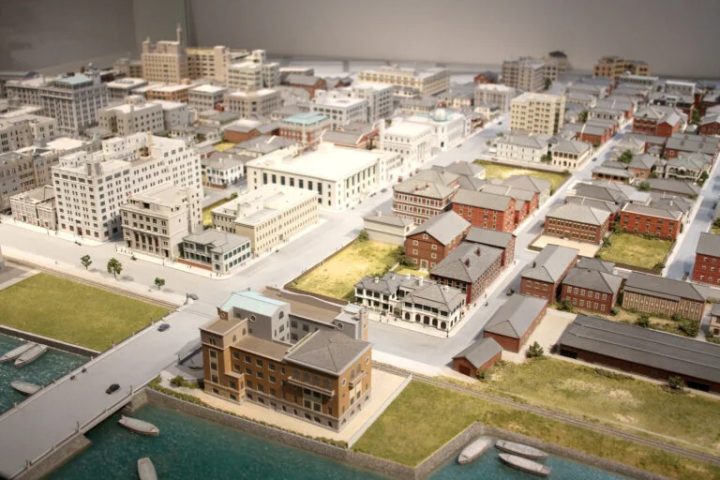
![[Kobe City] “Kobe City Museum” is a famous Showa-era building that was renovated from a former bank.](https://resources.matcha-jp.com/resize/720x2000/2023/12/16-157486.webp)
Additionally, on the first floor there is an Information Corner with books and materials about Kobe, as well as an Experiential Learning Room for children, both of which are available for free use.
![[Kobe City] “Kobe City Museum” is a famous Showa-era building that was renovated from a former bank.](https://resources.matcha-jp.com/resize/720x2000/2023/12/16-157487.webp)
![[Kobe City] “Kobe City Museum” is a famous Showa-era building that was renovated from a former bank.](https://resources.matcha-jp.com/resize/720x2000/2023/12/16-157488.webp)
In particular, the "Hands-on Learning Room" is equipped with hands-on learning items such as replica bronze bells and figure puzzles, making it a great place to visit for social studies classes.
Stop by the museum shop and cafe
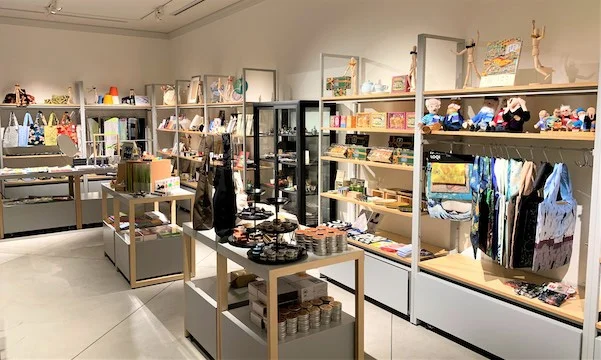
When visiting an art museum, some people look forward to buying souvenirs at the museum shop. Kobe City Museum also has a museum shop on the first floor, which is also free to use.
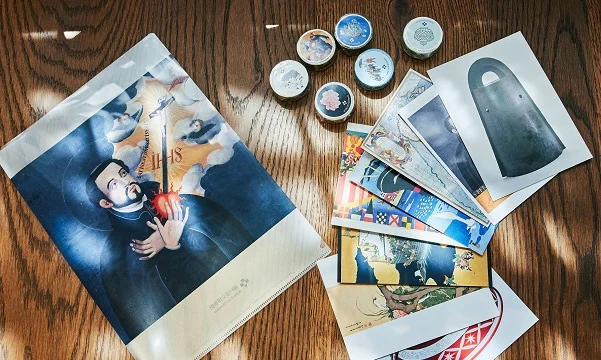
The most popular items are goods related to the "Statue of St. Francis Xavier." There are also many original Kobe City Museum products, some of which can be purchased at the online shop.
basic information
Museum shop hours: Weekdays 9:30-17:30, Fridays and Saturdays until 19:30
Regular holiday: Mondays in principle (if Monday is a public holiday, the following weekday)
*This may vary depending on the special exhibition.
*In addition to the New Year holidays, the museum may be closed or open on other occasions, such as during maintenance closures.
![[Kobe City] “Kobe City Museum” is a famous Showa-era building that was renovated from a former bank.](https://resources.matcha-jp.com/resize/720x2000/2023/12/16-157491.webp)
Next to the museum shop is the museum cafe "TOOTH TOOTH Dekoboko Sabo." Why not enjoy a leisurely tea time savoring original sweets that combine Western confectionery with a Japanese twist?
basic information
TOOTH TOOTH Dekoboko Sabo
Business hours: 9:30-17:30 (last orders 16:30), Fridays and Saturdays until 19:00 (last orders 18:30)
Closed: Same as museum closing days
(Writer: Nakata/West Plan)
*This article is current as of July 2023. Prices include tax. Product contents and prices may be subject to change.
Great value bus tickets
Kobe 1-day bus ticket
This is the perfect ticket for sightseeing in Kobe City! This bus ticket allows unlimited use of the City Loop and Port Loop that run through Kobe City for 700 yen per day. If you're going around Kobe 's tourist spots, use this ticket for an easy and comfortable trip.
Hyogo Amazing Pass
If you are considering touring around Himeji and Hyogo prefecture in addition to Kobe , we recommend this ticket! This mobile ticket includes the contents of the Kobe 1-day bus ticket and allows unlimited rides on Shinki Bus route buses for 1,000 yen per day. *Limited to foreign visitors tourists visiting Japan
basic information
Kobe City Museum
Address: 24 Kyomachi , Chuo Ward , Kobe City Hyogo Prefecture
Phone number: 078-391-0035
Business hours: 9:30-17:30 (entrance until 17:00)
*Open until 19:30 on Fridays and Saturdays during special exhibitions (entry until 19:00)
*Opening times vary depending on the special exhibition. Please check the website for details.
Closed: Mondays (open if Monday is a public holiday, closed the following weekday)
Admission fee: Kobe History Exhibition Room (1st floor): Free; Collection Exhibition Room (2nd floor): 300 yen for adults, 150 yen for university students, free for high school students and younger (200 yen for adults, 100 yen for university students if you show your special exhibition admission ticket on the day)
*Discounts are subject to change. Please check with the information desk on the 1st floor. Special exhibitions: Varies depending on the exhibition.
Access: 10 minutes on foot from Sannomiya Station or Motomachi Station
Parking: None
What are good things and good experiences? There are many characteristics such as having a story to tell, overflowing with the thoughts of the creator, having a history, and being loved by the locals. Have you ever come across a special thing or experience that made you want to tell someone about it? And as a result of telling, someone new leads to something. We think that's what "good" is all about. In order to deliver such encounters to our customers, we discover Hyogo's good things based on the concept of "talk, communicate, and connect", and provide information that will shorten the emotional distance between customers and the region of Hyogo Prefecture.
The contents on this page may partially contain automatic translation.


![[Kobe City] A one-day bus ticket is a great deal if you want to visit Kitano Ijinkan-gai, Nankin-cho, and other famous spots in Kobe!](https://resources.matcha-jp.com/resize/200x2000/2023/09/25-146866.webp)
![[Hyogo Prefecture] Unlimited rides on local buses for just 2,500 yen! Travel around Hyogo Prefecture at a great price](https://resources.matcha-jp.com/resize/200x2000/2023/09/25-146913.webp)





























![[Gunma, Nakanojo] Experience Japanese history in a wooden school building from the Meiji era](https://resources.matcha-jp.com/resize/720x2000/2025/12/25-254022.webp)
![[30 minutes from Nagoya ] A itinerary for Tokoname 's "Lucky Cat" to visit Japan's number one Beckoning Cat town](https://resources.matcha-jp.com/resize/720x2000/2026/02/17-258884.webp)
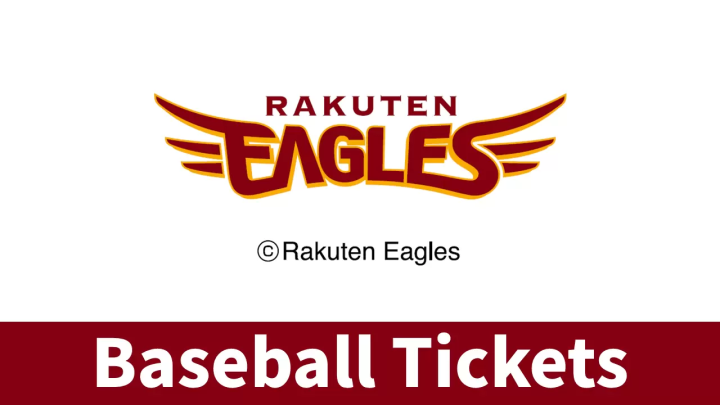
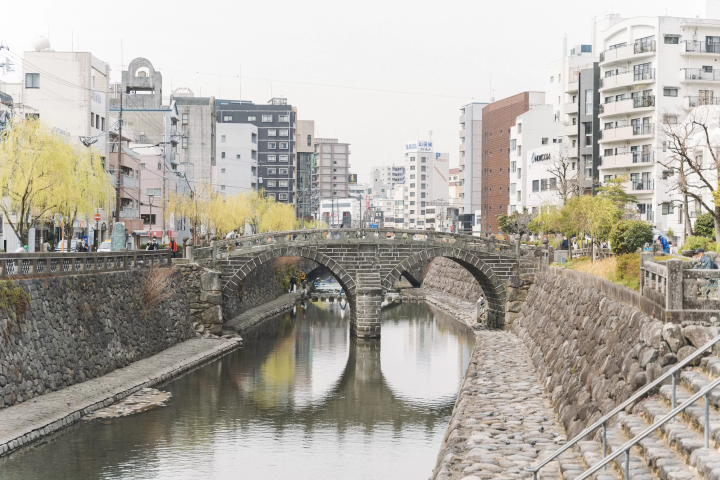
![[During Your Kumano Trip] Cape Shionomisaki Tourist Tower](https://resources.matcha-jp.com/resize/720x2000/2025/11/05-249097.webp)